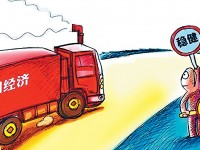Ben Reynolds, Writer and Foreign Policy Analyst in New York
Sep 01, 2015
When playing up the mutually beneficial aspects of economic cooperation between the U.S. and China, many theorists often ignore the competitive and destabilizing elements introduced by structural economic concerns. The struggle for emerging markets and untapped resources is adversarial, and it may intensify as economic growth slows.
Fernando Menéndez, Economist and China-Latin America observer
Aug 31, 2015
The downturn of global financial and foreign exchange markets, is causing concerns in the Americas. A Chinese trade and investment focus on the “Pacific Pumas” would be a prudent strategy and help reduce tensions and suspicions between the U.S. and China in the region.
Fred Hu, Chairman, Beijing-based Primavera Capital Group
Aug 28, 2015
Moderating growth rates in the range of 5-7% per annum reflect the higher per capita income level and the changing growth paradigm in China. A modest slowdown is a necessary and healthy adjustment for China to transition to a new trajectory of more efficient and sustainable growth. But instead of greeting such a positive "new normal" with enthusiasm, the naysayers have reacted with dismay as though they would rather prefer the old growth model.
Jin Bei, Professor and Editor-in-Chief, China Economist
Aug 27, 2015
China has entered into a crucial period of comprehensive deepening of reform. Reform carried out in some areas has already addressed quite a few chronic problems. Other major reform initiatives are under deliberation as well.
Dan Steinbock, Founder, Difference Group
Aug 26, 2015
As the Fed is paving way for the first rate hike in a decade, the world economy prepares for the greatest shift of capital flows in five years. Recent market turmoil in the U.S. and China heralds the transition.
Aug 25, 2015
Achieving the environmental goals presented to the UN not only can help China effectively control greenhouse-gas emissions and address global climate change, it will lay a good foundation to improve the ecological environment especially air quality. That creates an inspiring model for other nations as the Paris climate change conference approaches, where success depends on respect for developing nations varying capacities to make change and a spirit of cooperation, not confrontation.

Curtis S. Chin, Former U.S. Ambassador to Asian Development Bank
Aug 12, 2015
The tremendous volatility of China’s markets has led to direct and indirect government involvement, which is ultimately a short-term fix. Beijing must re-commit to the opening of its financial markets and to a deepening of capital market reforms.
Xu Shaoshi, Chairman, National Development and Reform Commission
Jul 15, 2015
Enjoying great potential and elasticity, the Chinese economy has enough leeway to cope with various changes and challenges, and its general trend of steady growth -- pushing the global economy towards recovery -- remains unchanged.
Sun Lijian, Associate Professor, Fudan University
Apr 15, 2015
To offset weaker export numbers and a reliance on foreign reserves, China needs a growth model that emphases quality goods and innovation-led growth. A twenty-first century economic model of innovation particularly requires the support of a highly efficient financial system, a sound legal system of intellectual property protection, fair tax incentives, and better entrepreneurial education.

Niu Li, Director of Macro-economy Studies, State Information Center
Mar 18, 2015
Despite China’s remarkable growth, the property market still faces the challenges of consolidation, industrial overcapacity, financial risk, deflationary risk, and structural employment issues. In response the government will adjust to the economy’s “new normal” of slower growth, move toward an innovation based economy with more public goods and services, and pursue a proactive fiscal economy and a prudent monetary policy.